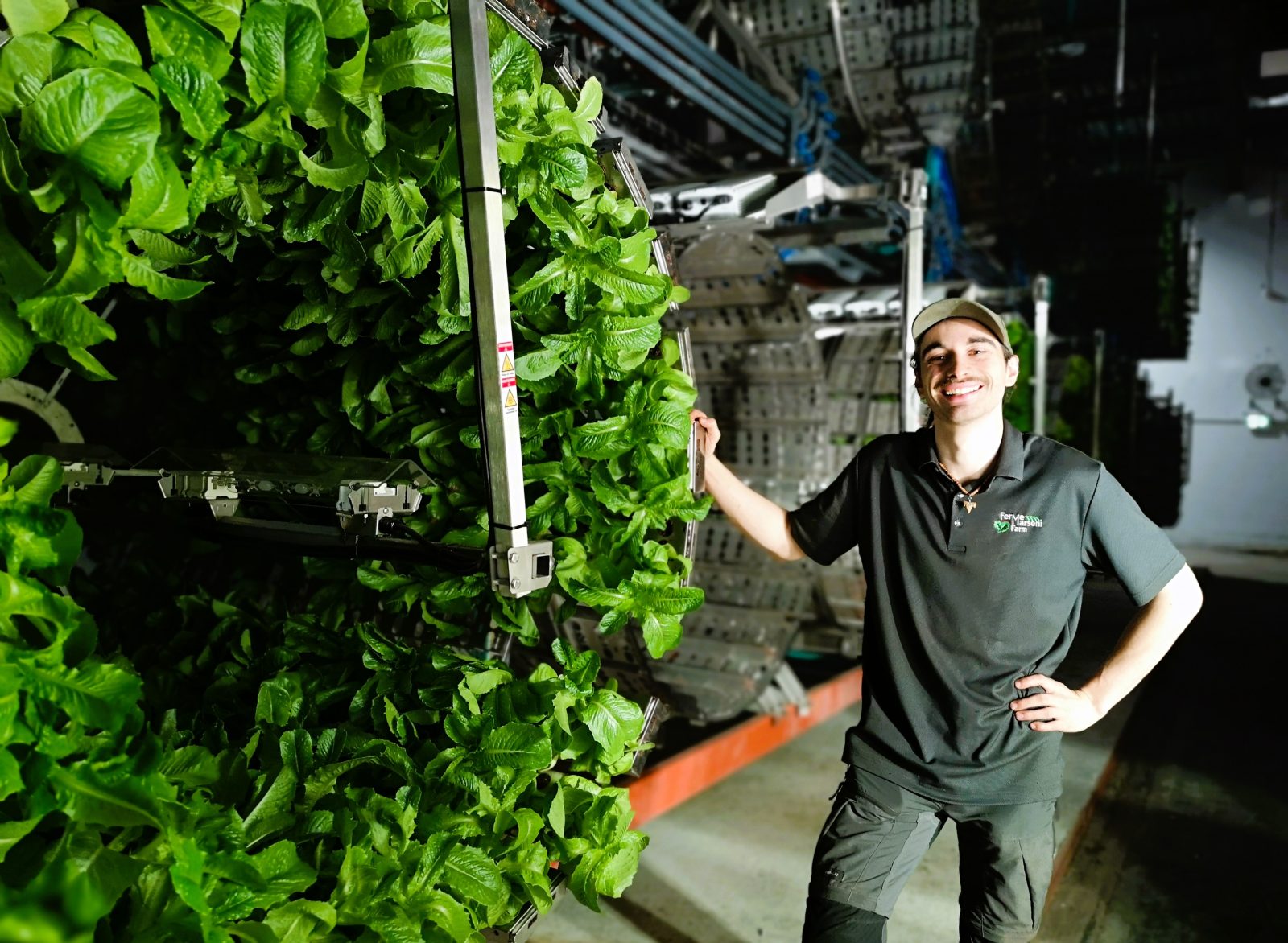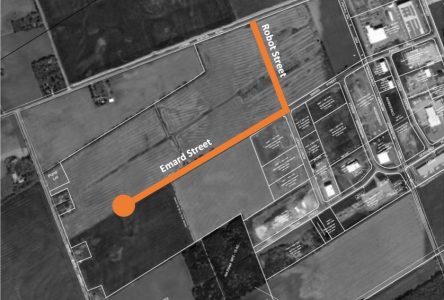Leaving much of their nomadic hunter-gatherer skills and existence behind them, humans settled down and started domesticating plants and wildlife – farming, in other words – about 11,000 years ago.
And the first obstacle they faced was probably unpredictable weather.
Too hot, too cold, pests, too much rain, not enough rain, rain at the wrong time and sabretooth cats.
The temperamentality of Mother Nature isn’t an issue at Marseni Farm, however.
Located along the South Nation River in Casselman, the new farm currently grows basil and a variety of lettuces and herbs – and they do it in a completely controlled indoor environment.
Covering 10,000 square feet and known as a “vertical farm,” Marseni began calculating formulas, crunching data and testing the best way to grow certain crops in April 2023.
The small company of a half-dozen employees was then packaging its produce for stores in the early weeks of 2024, including the No Frills in Casselman, Mike Dean Local Grocer in Bourget and Independent in Rockland.
With facilities spread out over two floors of an old building erected in the 1960s, the business retrofitted the space into a maze of hallways, growing rooms and refrigerated areas holding trays of basil and lettuce sprouts behind PVC strip curtains.
A conveyor belt just beneath the ceiling brings in fresh soil from an adjacent room and then snakes its way back around the facility to remove used soil for composting.
There’s a heavy-duty water filtration system and racks of empty food-grade stainless steel trays waiting to be loaded with seeds and soil.
In several areas, there are computer screens and laptops, while a robotic device in a glass case plants seeds into the trays: of course, the robot can do in 45 minutes what it would take two humans three hours to do.
After their time spent as tiny sprouts in their trays, the basil and lettuce are moved to the primary growing room and loaded into a series of large stainless-steel “wheels,” mechanisms built by Gigrow, a Quebec company; the dozens of wheels look like a stack of turbines or the engine room of a Brobdingnagian space station in a science fiction movie.
Turning through 360 degrees every 50 minutes, the wheels of the “injection rotary garden” system (currently 28 of 50 machines are in operation at Marseni) ensure the young plants get optimal amounts of water, fertilizer and light – elements that farmers regularly worry about – each day as they slowly rotate.
Needless to say, it’s a unique business model and a unique way of farming with a regular and continuous revenue stream.
As weather systems become harsher and more erratic, it’s likely that this could be the wave of the future with no worries about hail, frost or drought, according to Marseni agronomist Maxime Gagnier, a fifth-generation family farmer who holds an agriculture degree from Laval University.
“We have control over everything that could happen to the plants. There’s no insects, no disease, no pesticides, no temperature change that could affect them,” Gagnier says of the computerized system that allows him to control precisely for temperature, humidity, soil conditions and nutrients – from his smartphone.
“From A to Z, everything is controlled so we get produce as it should be,” he says.
Production is highly consistent: one machine can produce 22 kilograms of basil in 18 days – what would take 60 days on conventional farms. That’s a lot of pesto considering a package of basil is about 20 grams.
While there are many greenhouse operations across the country, Marseni’s system is unique in this part of eastern Ontario; their current operation is in phase one, according to Gagnier, which will eventually have 88 machines at work.
With conventional farming, weather conditions will dictate how a crop will look and what it will yield. With those variables eliminated, the controlled environment in a vertical-farm operation virtually guarantees bumper crops.
While the so-called farm-to-table mantra continues to resonate with consumers looking for healthy local food, Marseni’s production system adds a layer of sustainability as something approaching closed-loop permaculture with the range of inputs and outputs accounted for and waste reduced.
Because water is injected directly into the plant’s roots rather than dripping off the leaves and lost, the essential oils of basil, for instance, remain on the leaves and that, in turn, means flavour.
“What the plant produces and stores in its leaves stays there. It tastes like the basil or lettuce should taste,” Gagnier says.
The growing period for indoor agriculture is 365 days – and that means, conceivably, 12 annual harvests – with a carbon footprint greatly reduced from the food miles racked up for basil that comes from California’s Central Valley, Mexico or Colombia before it ends up in your pasta sauce.
Given the control of inputs and no pesticides and herbicides in use, is injection rotary gardening healthier? It likely is, though Gagnier can’t show any data to that effect right now. He does say that Marseni basil has more of the essential oils and flavour in its composition.
For those who might scoff that this is farming by computers and data, the reality is otherwise. Climb into the cab of a modern combine harvester, and you’ll find an ergonomic space for two human operators assisted by a half-dozen computer and display screens, cameras and sample-logistics readouts and printers.
As for the data, according to Farm Credit Canada, the vertical farming market in Canada is expected to grow by about 21 per cent by 2027 as a response to a growing demand for organic food and a need for increased production year-round, especially in a northern climate.
Gagnier’s response is much simpler, however, if you ask if the rotary action of the technology at start-up Marseni Farm is, to mix a metaphor, part of a new wave of farming and food security.
“We’ve only had positive feedback that this farming method looks promising as a way to have a secure food source year-round,” he says. “This a progression in providing herbs and lettuce when the weather isn’t cooperating.”
Food writer Andrew Coppolino lives in Rockland. He is the author of “Farm to Table” and co-author of “Cooking with Shakespeare.” Follow him on Instagram @andrewcoppolino.



